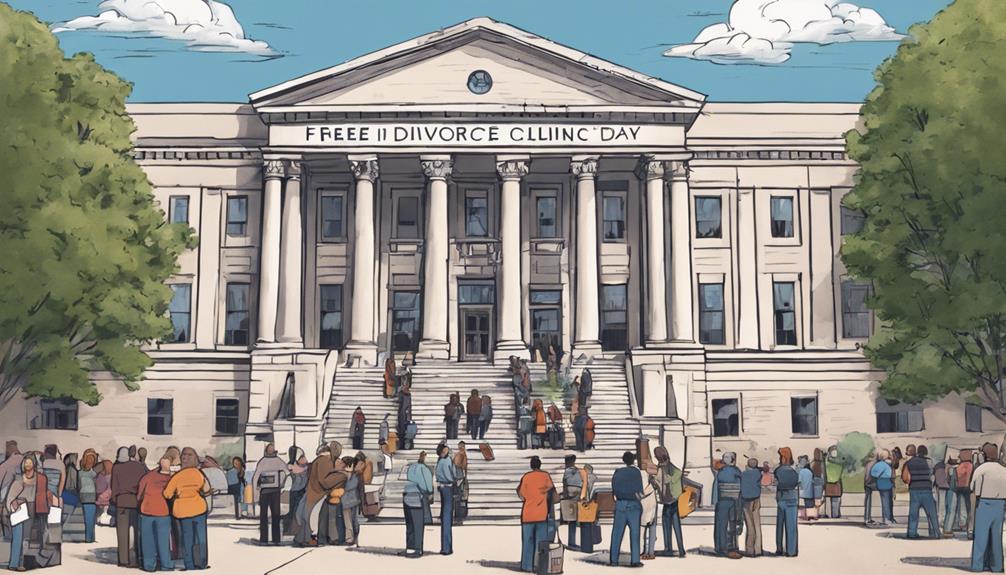Choosing between divorce planning and marriage counseling depends on your relationship’s goals. Counseling helps improve communication, rebuild trust, and strengthen your bond if both partners want to work things out. Divorce planning focuses on managing legal, financial, and emotional logistics when separation is inevitable or decided. Understanding your situation and priorities will guide your choice. Keep exploring to discover how each option can best support your next steps.
Key Takeaways
- Choose marriage counseling when both partners want to improve their relationship; opt for divorce planning if separation is inevitable.
- Counseling aims to resolve issues and rebuild trust; divorce planning manages legal, financial, and logistical aspects of separation.
- Effectiveness of counseling depends on mutual commitment; divorce planning provides emotional support during the transition.
- Counseling is best for couples seeking to strengthen their bond; divorce planning is necessary when safety or irreconcilable differences exist.
- Timing is key: counseling for ongoing relationship issues; divorce planning once the decision to separate is made.

Deciding between divorce planning and marriage counseling depends on your relationship’s current state and future goals. If you’re feeling uncertain about your marriage’s future, understanding what each option offers can help you make an informed choice. Marriage counseling is designed for couples who want to work through issues, improve communication, and strengthen their bond. It provides a safe, non-judgmental space to explore feelings, rebuild trust, and develop new skills for resolving conflicts. When both partners are committed to saving the relationship, marriage counseling can be highly effective—studies show success rates of 70% to 80%. Techniques like cognitive-behavioral therapy and emotionally focused therapy are well-established methods that address core relationship problems. Premarital counseling, in particular, helps couples before issues arise, often leading to lower divorce rates and higher relationship satisfaction later. However, the effectiveness of couple therapy can diminish over time if ongoing effort isn’t maintained, highlighting the importance of commitment and continued work.
On the other hand, divorce planning is appropriate once a couple has decided that separation is inevitable. It’s a process focused on managing the legal, financial, and emotional aspects of ending a marriage. Divorce planning involves preparing for child custody arrangements, financial settlements, and legal procedures to ensure a smoother *shift*. This process doesn’t directly improve relationship quality but helps manage the logistics and emotional stress associated with separation. Emotional support during divorce planning is *vital*—many people need help coping with grief, adjusting to new realities, and *steering* co-parenting challenges. It’s important to recognize that divorce carries risks, including regret if issues could have been resolved through counseling. In situations involving abuse or violence, counseling that aims to preserve the relationship might be unsafe; safety should always come first, and individual counseling with safety planning is preferable. Additionally, understanding the role of Self Watering Plant Pots can symbolize the importance of providing consistent care and support during transitional life phases.
Timing plays a significant role in choosing between these options. If both partners want to work on their marriage, counseling is the best route. If uncertainty exists, discernment counseling can help clarify feelings and options over a short period. When divorce is decided or unavoidable, legal and emotional preparations should be prioritized through divorce planning. Premarital counseling can also prevent future problems, setting a strong foundation from the start. Ultimately, your choice depends on your relationship’s health, your goals, and safety considerations—understanding what each approach offers helps you *steer* this complex decision with clarity.
Frequently Asked Questions
Can Divorce Planning Be Helpful Even if I Want to Stay Married?
Yes, divorce planning can be helpful even if you want to stay married. It allows you to proactively address financial issues, clarify asset division, and prepare for potential challenges down the line. By having open conversations and creating plans, you reduce stress and strengthen your relationship. Planning ahead isn’t about expecting divorce but about safeguarding your shared future, ensuring both partners feel secure and prepared for any unexpected circumstances.
How Do I Know if Marriage Counseling Is Right for My Relationship?
Think of your relationship as a garden that’s become overgrown with weeds. If you notice persistent communication breakdowns, recurring problems, and a shared desire to nurture growth, marriage counseling might be your watering can. If both of you can commit time, effort, and openness, counseling can help clear out the weeds and restore health. Usually, it takes around 12 sessions to see meaningful progress, so if you’re willing to invest, it’s worth trying.
What Financial Considerations Should I Keep in Mind During Divorce Planning?
When planning your divorce, you should consider how asset division impacts your finances, including retirement accounts, real estate, and investments. Be aware of legal fees, which can add up quickly, and explore mediation to save costs. Also, plan for ongoing expenses like child support and alimony, and think about healthcare coverage. Budget carefully, rebuild your savings, and consider consulting a financial advisor to ensure you’re financially prepared for this shift.
How Long Does Marriage Counseling Typically Take to See Results?
Marriage counseling often unfolds like a gentle sunrise, revealing progress within six months. You’ll notice improvements in communication, trust, and emotional connection as you work through sessions weekly, then biweekly, and eventually monthly. While some complex issues may extend the journey, most couples see meaningful changes around the 12 to 20 session mark. Stay committed, and you’ll find your relationship blossoming into a brighter, more resilient version of itself.
Are There Legal Implications I Should Consider Before Choosing Divorce Planning?
Before choosing divorce planning, you should consider legal implications like state-specific residency requirements, grounds for divorce, and mandatory disclosures of assets and debts. You’ll need to understand how your estate planning documents, such as wills and beneficiary designations, might be affected. Also, be aware of automatic legal protections, like restraining orders or asset freezes, which could impact your financial situation and personal safety during the process.
Conclusion
Ultimately, whether you choose divorce planning or marriage counseling depends on your situation. Remember, around 70% of couples who seek counseling report improved relationships. If you feel that reconciliation is possible, counseling might be your best route. But if your issues seem insurmountable, planning a fair and thoughtful divorce could be healthier. Trust your instincts and prioritize your well-being—sometimes, making the tough choice is the best step toward a better future.










